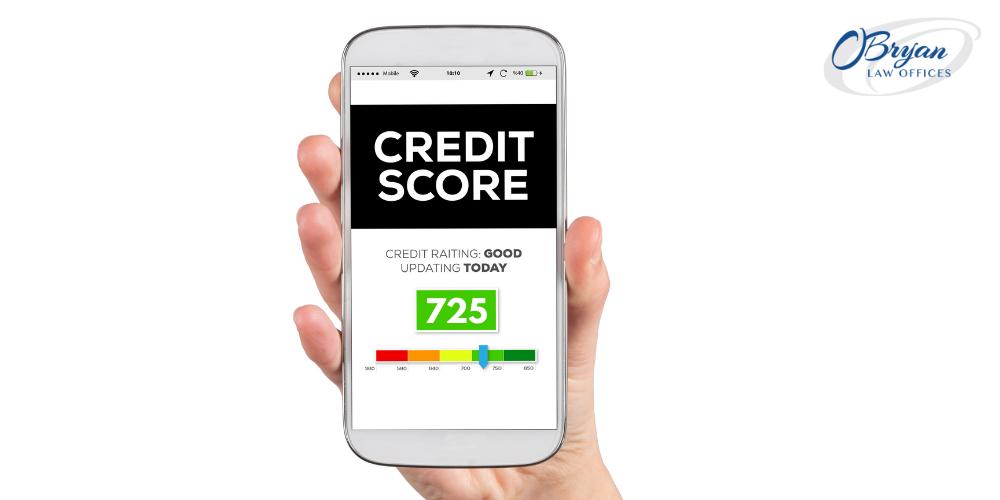725 Credit Score to 749 Credit Score

Understanding a Credit Score

Despite the fact that a credit score is only three numbers long, it can have a significant impact on your financial status. Your credit ratings may affect your ability to qualify for a loan or a credit card by signaling to potential lenders how likely you are to repay your debts. Understanding whether or not a 725 credit score, for example, is good enough to qualify for financial opportunities is highly important. Knowing what factors affect your credit score might help you figure out how to increase it over time. No matter what your credit score is, it’s imperative that you understand the doors it will open for you.
At O’Bryan Law Offices, we see many different clients for many different reasons. Some of our clients seek debt counseling, while others come to us for Chapter 7 bankruptcy or Chapter 13 bankruptcy. No matter the reason, our skilled Louisville bankruptcy attorneys are here to help. We have extensive experience handling complex financial situations for those both with and without debt. If you find yourself in a financial bind, feel free to contact us. Call 502-339-0222 today, or fill out our online intake form to schedule your free consultation.
What Is the Credit Scoring System?
A credit rating system enables lenders and other financial organizations to assess an individual’s creditworthiness. Some financial institutions have developed their own credit rating system.
The majority will rely on a third-party professional service, such as the credit scoring model developed by Fair Isaac Corp. This system, sometimes referred to as FICO, is the most frequently utilized. FICO’s credit scoring methodology provides a numerical value to creditworthiness that runs from 300 to 850. The higher the number, the better the person’s credit rating.
The credit scores issued by the systems are influenced by a variety of variables. Payment interest, the length of time a person has used credit, the quantity of debt a person has, and the sorts of debt a person has are all factors.
These approaches are used by lenders to evaluate how much danger a specific borrower poses to them if they decide to lend to them. These numbers are calculated on the basis of risk.
If a person’s credit score is poor, he or she will likely spend more to borrow money to buy a house or finance a car than someone with a higher credit rating. Individual lenders choose which amount is acceptable and how much interest to charge, whereas credit rating systems provide a guideline.
How Is Credit Score Calculated?
Your credit score is more than just a number. It indicates your likelihood of repaying a debt. There are five distinct elements that contribute to determining your score in your credit reports. We list these below.
- Payment history: This indicates if you make timely payments on all of your accounts. Your payment history accounts for 35% of your credit score.
- Credit utilization: This covers the majority of your available credit that has been utilized. If at all feasible, keep your overall credit limit to 30% or less. Your credit score is determined by 30% of your credit use.
- Credit age: Credit age indicates the length of time you’ve had credit and the age of each of your accounts. Close older accounts only if they include a lot of bad material. Credit age accounts for 15% of your credit score.
- Credit mix: This refers to the many sorts of credit accounts you have, such as revolving and fixed-payment credit cards. Lenders like a credit combination that is diversified. This component is responsible for 10% of your credit score.
- Credit inquiries: This shows how many times in the previous several months or years you’ve applied for additional credit. Your credit score is made up of 10% new credit applications.
Why Do I Have Multiple Credit Scores?
A credit score is a three-digit figure that represents an informed judgment about your likelihood of repaying a loan on time. You have many scores since they are created by multiple companies, and there are different scores for different purposes.
As scoring firms change scores to make them more predictive, there are also multiple versions. This means that the maximum and minimum credit score differs depending on the scoring model you use. Your results may vary depending on the following factors.
- Which credit bureau reports the data
- The scoring company and the formula they use
- The credit score ranges used
Credit Score Ranges
Knowing where your credit score falls in the FICO and VantageScore categories may help you determine whether or not you’ll be accepted for a loan or credit card, as well as the interest rate you’ll receive.
The VantageScore and FICO models differ in several ways, including how they prioritize different variables when determining your ratings. Both have a 300-850 point credit range, but their definitions of poor, fair, good, and excellent are different.
| Credit Score Ranges | VantageScore | FICO |
| Excellent | 781-850 | 800-850 |
| Very Good | N/A | 740-799 |
| Good | 661-780 | 670-739 |
| Fair | 601-660 | 580-669 |
| Poor | 500-600 | <580 |
| Very Poor | <500 | — |
Is 725 a Good Credit Score?
A FICO Score of 725 is within the Good range of scores, which range from 670 to 739. The average FICO Score in the United States is 710, which is in the Good category. Consumers with Good FICO Scores are considered acceptable borrowers by a large number of lenders in the United States. This means they consider you eligible for a wide range of credit products, including auto loans. However, they may not charge you the lowest interest rates or offer you their most preferential offerings.
Is 727 a Good Credit Score?
A credit score of 727 is considered good. People with credit scores of 700 to 749 have acceptable credit, while those with scores of 750 to 850 have outstanding credit. People with these high credit scores are in a strong position to qualify for the finest mortgages, car loans, and bank cards, a higher credit limit, and more.
Is 728 a Good Credit Score?
A FICO score of 728 is deemed Good. With a 728 credit score, getting a mortgage, vehicle loan, or personal loan is very simple. Because it is less hazardous, lenders prefer to work with consumers who have good credit. One of the most effective methods to raise your credit score and unlock even better loan rates for you and your family is to repair your credit.
Is 729 a Good Credit Score?
Scores vary from 300 to 850 on the FICO scale. A credit score of 729 is considered Good, as seen above. Most lenders will lend to customers who have good credit ratings. You do, however, have space for development. With a 729 credit score, you should improve your credit scores before applying for any loans to ensure you obtain the best possible interest rates.
Is 730 a Good Credit Score?
A credit score of 730 is generally considered to be a good credit score. Credit scores typically range from 300 to 850, and higher scores are generally associated with lower credit risk. While specific score ranges may vary slightly among credit scoring models, a score of 730 is usually above average and indicates responsible credit management.
Is 735 a Good Credit Score?
Yes, a credit score of 735 is considered to be a good credit score. Credit scores typically range from 300 to 850, and a score of 735 is above average. With a score in this range, you are likely to qualify for most financial products and services, including loans and credit cards, at favorable interest rates.
Is 736 a Good Credit Score?
A credit score of 736 is considered good. You are extremely likely to get approved for credit cards and loans if your score falls within this range. You’ll also get better-than-average interest rates and credit conditions, which will save you money over the duration of your loan.
Is 738 a Good Credit Score?
Lenders use credit scores to assess the risk of lending to individuals, and higher credit scores generally indicate a lower risk of default. Having a score of 738 suggests responsible credit management, and you should be in a good position to secure credit when needed.
Is 740 a Good Credit Score?
Yes, a credit score of 740 is considered an excellent credit score. Credit scores typically range from 300 to 850, and a score of 740 falls well above the average range. With a credit score of 740, you are likely to qualify for the most favorable terms and interest rates on loans and credit cards.
Is 741 a Good Credit Score?
With a credit score of 741, you have good credit. While you won’t obtain the highest rates, your interest will be minimal, and paying annual fees for a credit card will be unlikely. Your credit score might simply increase if you get the appropriate credit card.
Is 742 a Good Credit Score?
Your FICO Score is in the range of 740 to 799, which is regarded as Very Good. A FICO score of 742 is higher than the national average. Borrowers with Very Good credit ratings are usually eligible for higher interest rates and product offerings from lenders. Only 1% of consumers with Very Good FICO Scores are expected to become significantly delinquent in the future, according to statistics.
Is 743 a Good Credit Score?
With a credit score of 743, getting a mortgage and house loan should be simple. Your present credit rating falls into the second-highest credit rating category. You should be able to obtain a mortgage or a house loan without difficulty. The best method to acquire a house loan with a 743 credit score is to do a little credit repair and then apply and wait.
Is 745 a Good Credit Score?
While a credit score of 745 is excellent, keep in mind that individual lenders may have slightly different criteria for evaluating credit scores, and they may consider additional factors when making lending decisions. Regularly monitoring your credit, checking your credit reports for accuracy, and maintaining responsible credit habits can help you sustain or improve your credit score over time.
Is 749 a Good Credit Score?
Fortunately, if you have a 749 credit score, lowering your credit use can quickly boost your credit score into the excellent category. And it would enable you to save hundreds, if not thousands, of dollars every year.
How Can Bankruptcy Help My Credit Score?
If you find yourself in a situation where you need to file for bankruptcy, your credit score is less significant than the grounds for filing. A looming paycheck garnishment or mortgage foreclosure is more urgent than getting a new loan or credit card.
However, once you’ve been granted bankruptcy relief, you could discover that the bankruptcy really helps your credit. Even though your bankruptcy will appear on your credit report for up to 10 years, this is true. In fact, bankruptcy has both short-term and long-term positive effects on your credit. We list these below.
Short-Term Positives
Gets rid of delinquent account reports: If you have late payments and significant credit balances on your credit record, a bankruptcy discharge can help you the most. Those debts will be wiped clean if you file for bankruptcy. This is due to the fact that obligations discharged in bankruptcy are no longer considered overdue. They will usually be recorded as dismissed or included in your bankruptcy instead. In certain cases, this may help to improve a credit score that is already poor.
Improves your credit-to-debt ratio: Your FICO credit score is made up of about 30% of the amounts you owe on accounts. The proportion of your available credit that you’re utilizing is an essential consideration in this research. Bankruptcy may aid in the reduction of your debt-to-credit ratio. This ratio compares your outstanding debt to the amount of credit you have available.
The smaller your debt is in comparison to your accessible credit, the better your FICO score might be. When you file for bankruptcy, your credit accounts with large credit limits are usually canceled or frozen. However, if you reaffirm debts with low amounts and acceptable credit limits following your discharge or open new credit accounts, your FICO score may improve.
Long-Term Positives
Bankruptcy provides you the chance to start over by erasing your debt history. You have another opportunity to get your finances in order. You can create the groundwork for creating a solid credit history if you budget correctly and are diligent with your money.
It’s a good idea to start rebuilding your credit as soon as possible after filing for bankruptcy. You should have greater discretionary income now that you are not burdened by the existing debt that you discharged in bankruptcy. This will allow you to make timely credit payments. You can raise your credit score over time if you have a strong track record of paying your new, post-bankruptcy bills on schedule. This might happen anywhere from six months to a year after filing for bankruptcy.
Call O’Bryan Law Offices Today
At O’Bryan Law Offices, we help our clients jump through all sorts of financial hoops in order to improve their credit scores through bankruptcy. Many people associate bankruptcy filings with a tragic, sharp drop in their credit score. Although this is true in many cases, restoring credit through bankruptcy is a very real option.
The bankruptcy process is just another credit restoration tool if you enlist the help of our Kentucky bankruptcy attorneys. For more information about how our bankruptcy experience can help you, please call 502-339-0222 or fill out our online intake form. We will help you get your free credit score report and analyze how to improve your score and overall finances with time.







